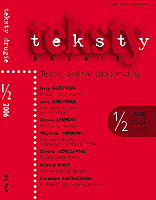

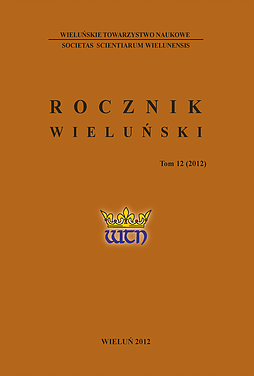
W Wydawnictwie AJD została przygotowana książka poświęcona jednemu z najwybitniejszych twórców literatury pamiętnikarskiej XVIII wieku, autorowi takich utworów jak Pamiętniki czyli Historia polska (kronika lat 1743–1798) oraz Opis obyczajów za panowania Augusta III (synteza obyczajowości czasów saskich). Monografia jest opracowaniem języka i stylu prozy Jędrzeja Kitowicza w kontekście stanu ówczesnego języka ogólnego oraz regionalnego. Badania nad językiem osiemnastego stulecia dotychczas brały pod uwagę głównie dorobek pisarzy wywodzących się z Kresów, brakuje natomiast opracowań poświęconych autorom z rdzennej Polski. Omawiana książka wypełnia lukę badawczą, czyniąc celem dociekań realizację języka reprezentanta Wielkopolski, którego uznany dorobek nie był dotychczas przedmiotem szczegółowych analiz językoznawczych. Tym samym recenzowana publikacja uzupełnia stan badań nad językiem osobniczym oraz językiem XVIII wieku.
More...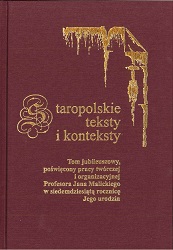
Keywords: Jan Malicki; anniversary; Old Polish literature; contexts
The publication is another (eighth) volume in the series “Old Polish texts and contexts”, intended for people who are interested in Old Polish writings and the variety of their contexts. This is an anniversary volume, developed to mark the occasion of Professor Jan Malicki’s 70th birthday. The scholarly articles which are a part of this publication were written by the collaborators and the students of the Professor.
More...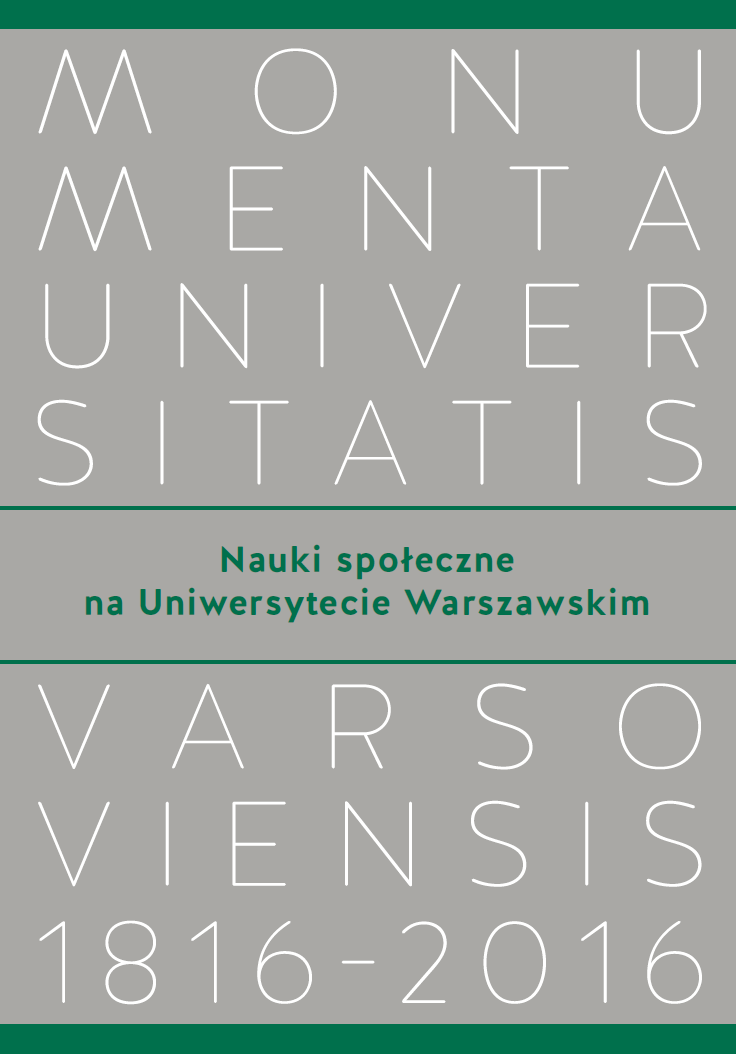
Keywords: social sciences; University of Warsaw; economics; political sciences; psychology; sociology; law
History of the social sciences at the University of Warsaw presented in the volume includes five main fields: economics, political sciences, psychology, sociology and law. The authors of the texts - specializing in the history of their disciplines - write about the process of their development on the academic level and about the changes they have been subjected within the University. The most important research currents, as well as the most distinguished representatives of the disciplines and their achievements are also reported.
More...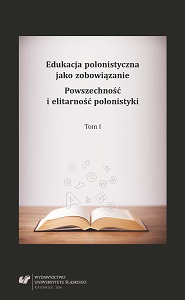
Keywords: culture text; university teaching; high school teaching; further training course for teachers;
This publication discusses the consequences of text-oriented model of education in three aspects: on the level of higher education, in the work of active Polish language teachers and in the context of the current needs of high school students. These issues are presented on the basis of the author’s own experience as an academic teacher, in reference to opinion of her students, and also of the other Polish language teachers from Świętokrzyskie Voivodeship. The text‑oriented model of education raises an urgent need to adapt higher education curricula to new competence requirements placed upon teachers. The graduates of the Polish studies should be equipped with the ability to interpret complex texts on culture reaching beyond the known methodologies of explanation of literary work. Short training courses in the interpretation of cultural texts are proposed for the secondary school teachers. The author discusses the example of an eighty-hour course entitled Interpretation of Cultural Texts. With regard to the needs of high school students, the author recommends preparation of manuals and handbooks adapted to the new formula of the matura examination. The author emphasizes the importance of teaching methods adequate to the interdisciplinary nature of the discussed issues and draws special attention to the qualities of poetic ekphrasis in school teaching.
More...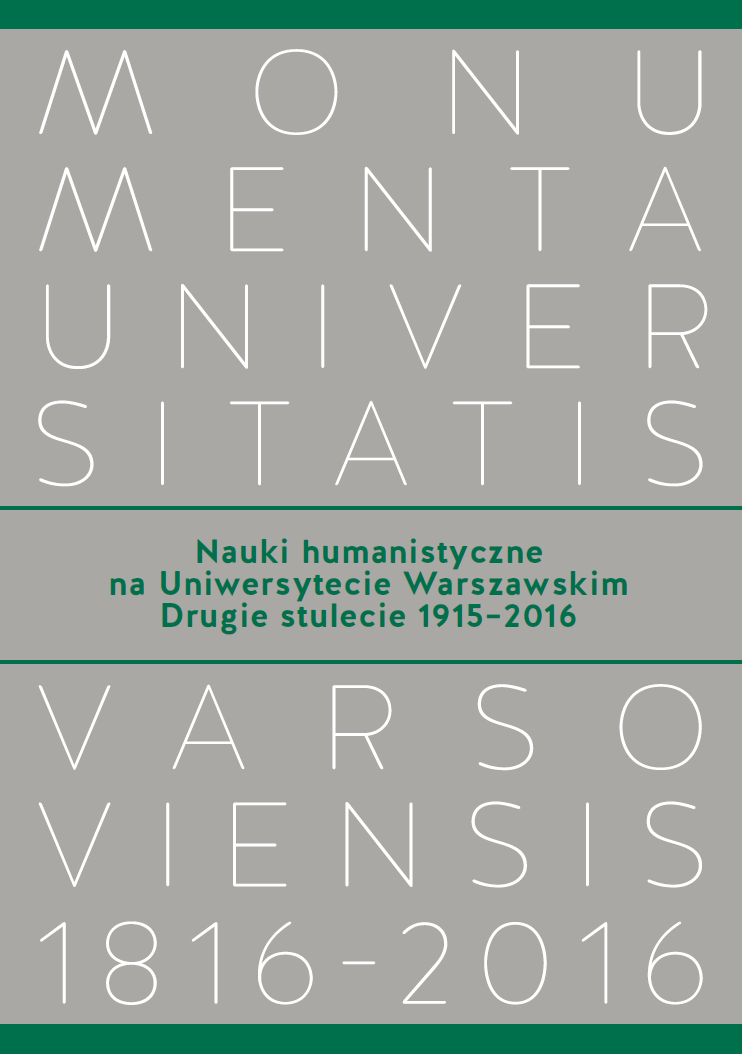
Keywords: Uniwersity of Warsaw; humanities at the University of Warsaw; history of science
History of the humanities at the University of Warsaw presented in two volumes covering first centenary (1816–1915) and second centenary (1915–2016).First volume contains history of humanities from the founding of the University through its different changes during the nineteenth century under the Russian rule till the restoration of the Polish University in 1915.Second volume presents the interwar period as well as the war times. Its second part consists of seven interviews with the illustrious representatives of humanities talking about postwar history of the University and its people.
More...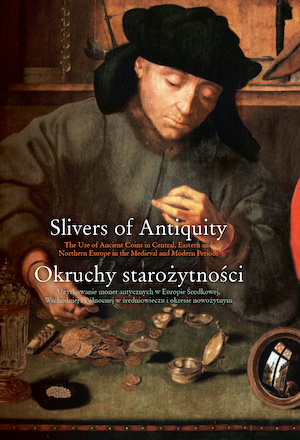
Keywords: denarius; Eastern Europe; Kievan Rus; Golden Horde; den’ga; hoard
The study of ancient coin finds recorded in Eastern Europe in later contexts is a relatively new research problem for this territory. In fact, this publication is the first attempt at a general analysis of this issue. The catalogue of finds contains twenty nine find spots, of which twenty four may be considered reliable. The smallest number of coins dates from the early medieval period. Not a single ancient coin was recorded in a context dated to the Pre-Kievan Rus’ Period (6th–9th centuries), and only three to the period of Kievan Rus (9th–13th centuries), all of them recovered in the north-western territories of Kievan Rus’). Consequently, there is no evidence to uphold the hypothesis of V. Yanin on the derivation of the early Rus’ weight system from the weight standard of the Roman denarius. The late medieval context is represented by thirteen reliable find spots, most of them associated with the Golden Horde hillforts of the Volga region. There is much to suggest the reuse of Late Roman copper coins within the population of the Golden Horde period. Another interesting subject is the possible influence of the iconography of Roman coins on the emergence of some types of late medieval Russian coins. Finally, eight reliable finds have yielded ancient coins found in a modern period context. Most of them are Roman denarii. Their similarity in size with the main 16th–17th century silver denominations of Europe may be treated as evidence that some of them participated in the local monetary circulation. On the other hand, the discovery of ancient coins, made into jewellery or as collectibles, suggests that the possession of a Roman coin also played a prestigious role at this time.
More...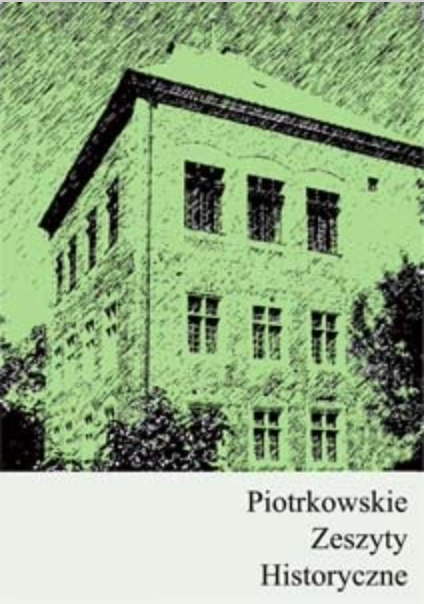
Keywords: ikonoklazm;
Book review: Początki bizantyńskiego ikonoklazmu (726-754). Teksty źródłowe, wstępy i opracowanie M. Jesiotr, ks. J. Naumowicz, przekład M. Jesiotr, Wydawnictwo Naukowe Uniwersytetu Kardynała Stefana Wyszyńskiego, Warszawa 2021
More...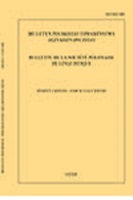
Keywords: discourse; religious polemic discourse; Polish brothers;
The study discusses the cognitive benefits of a discourse-oriented reading of old texts whose confessional polemic discourse of the Reformation period becomes meaningful again. The object of research are the communicative aspects of language and the various dimensions of socio-cultural life. The aim of the analysis is not so much discussing the characteristics of the code, but the description of its users, seen as subjects of discourse, and of the relations among them, of their knowledge system, ways of thinking about the world, basic concepts, ideas and values (or rather their profiles) contained in discourse, the communication strategies used, as well as the cultural and social conditions and institutional framework in which the discourse takes place. While on the one hand, from the research perspective, all these parameters make up the characteristics of discourse, on the other, the category of discourse allows for a consistent inclusion of such diverse properties in its description.
More...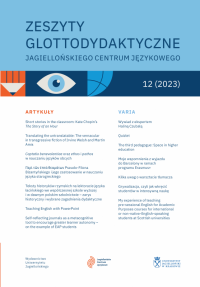
Keywords: Roman historiography; Roman historians; Latin language; the former Polish educa- tion; Latin classes at a modern university; historical ouline; didactic issues;
In this article the author focusses on two problems: these are a reception of Roman historical texts in the former Polish educational system and methods that can be used while working with students on translation and analysis of Roman historical texts in Latin classes at a modern university. In the first part of the paper, in a short outline the author presents which texts of Roman historians were read and how they were worked on in Polish schools from the Middle Ages to the twentieth century. In the second part of the article the author deals with se- lected didactic issues, which are often focused on during Latin classes nowadays. The author discusses here her own didactic experiences and presents some methods of working on reading, translation and analysis of Latin historical texts that can be used to make teaching and learning interesting and inspiring for both a lecturer and student.
More...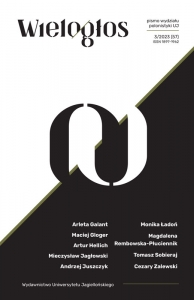
Keywords: Utopia; Thomas More; Tommaso Campanella; Francis Bacon; Johann V. An- dreae; women’s image; women’s history; 16th century; 17th century;
The article focuses on the analysis of classic utopian texts (Thomas More, Tommaso Campanella, Johann V. Andreae, Francis Bacon) in terms of women’s image presented in them. The author discusses the issues of the women’s place in the organization of utopian societies, the role of women in the family, the work of women and women’s access to science, in context of the equality of men and women declared by the authors of the literary utopias. The text compares utopian visions of ideal societies and the results of historical research on women’s place in Europe in the 16th and 17th centuries.
More...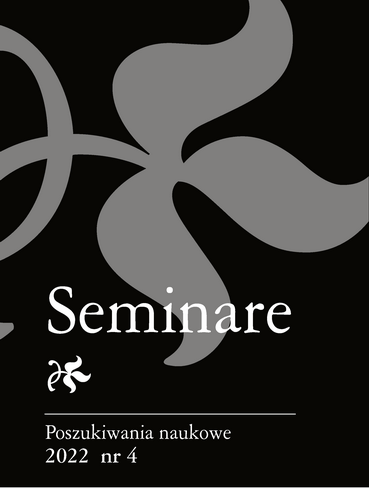
Keywords: book review;
Początki bizantyńskiego ikonoklazmu (726-754). Teksty źródłowe, wstępy i opracowanie Małgorzata Jesiotr oraz ks. Józef Naumowicz, przekład Małgorzata Jesiotr, Wydawnictwo Naukowe Uniwersytetu Kardynała Stefana Wyszyńskiego, Warszawa 2021, ss.189, ISBN 9788366018808.
More...
Keywords: dialects; dialectology; geographical and chronological language diversity; language changes in the countryside;
The subject of the description in the article are manifestations of linguistic awareness of the villagers contained in their dialectal texts from the Lublin region, south-eastern Lesser Poland, Lubawskie, Silesia and Kashubia. They include two conscious aspects of language: language in the geographical plane and language seen through the prism of changes (language in space and time).
More...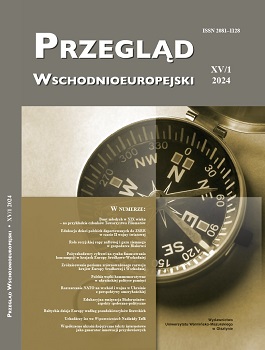
Keywords: paremiology; proverbs; innovation mechanisms; Ukrainian language;
In the article the Author analyses modern proverb modifications in the context of the assumptions of contextual studies within paremiology. Research material was excerpted from internet sources in the Ukrainian language that feature an especially dynamic process of creation of innovations based on canonical proverbs functioning in Ukrainian. This research is a continuation of analyses of modern tendencies in the European paremiology. Textological-pragmatical approach treats proverbs as situational macrosigns that have a wide range of usage in texts. Proverb modifications indicate that paremiology is still an active pragmatic form of verbalisation of varied messages that is effectively used by speakers in numerous texts and contexts.
More...
Keywords: Polish cinema; film theory; silent film; Karol Irzykowski; film criticism
The chapter examines texts of a film critic Andrzej Włast published in the “Ekran i Scena” magazine and a book by Karol Irzykowski, whose "The Tenth Muse: Aesthetic Aspects of Cinema" (1924) is the first theoretical study exploring the cinema as art in the Polish language. Both Włast and Irzykowski addressed issues of film movement and montage, film genres, stardom, and others, analyzing contemporary film production in Europe and the USA. It is interesting to follow parallels and differences in points of view of the two critics and writers to show the early stage of film theory in Poland and the ways of discussing the language of cinema, its status as an art form and as part of popular culture.
More...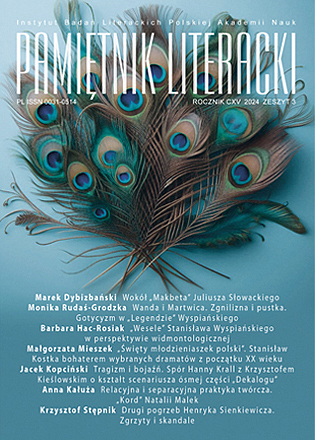
The text is a review of Karolina Dębska’s publication “Polskie tłumaczki literackie XIX wieku” (“Polish Female Literary Translators of the 19th Century,” 2023), which is the first on the publishing market to address the issue of the functioning of women translators in public space in such depth. The author focuses on revealing the habitus of 19th century female translators entangled in social norms, prohibitions, tendencies brought up from the family home—and shows them as factors influencing their translation decisions. Through a deep analysis topped by two lexicons: of Polish female translators of the first and second half of the 19th century, Dębska brings out of the shadows the figures so far overlooked in the pages of history or completely forgotten.
More...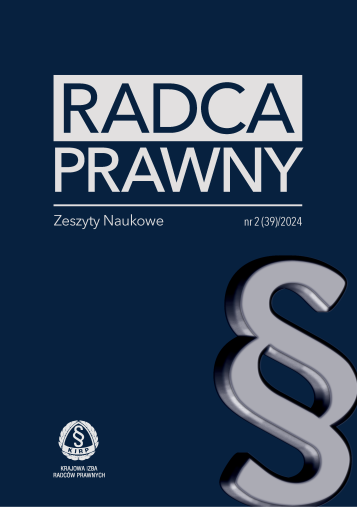
Keywords: conciliation proceedings; limitation period; deadline; Polish Civil Code; Polish Code of Civil Procedure;
In legal literature and practice, the issue of mutual relations between Article 121 § 6 of the PolishCivil Code and Article 118, the second sentence of the Polish Civil Code. There are various con-cepts relating to the expiry of the limitation period for a claim in a situation where an applicationto initiate conciliation proceedings is referred to in Article 184 et seq. of the Polish Code of CivilProcedure. The author analyzes the issue in question and proposes not only de lege conclusionsbut also proposals for appropriate statutory changes in the analyzed scope.
More...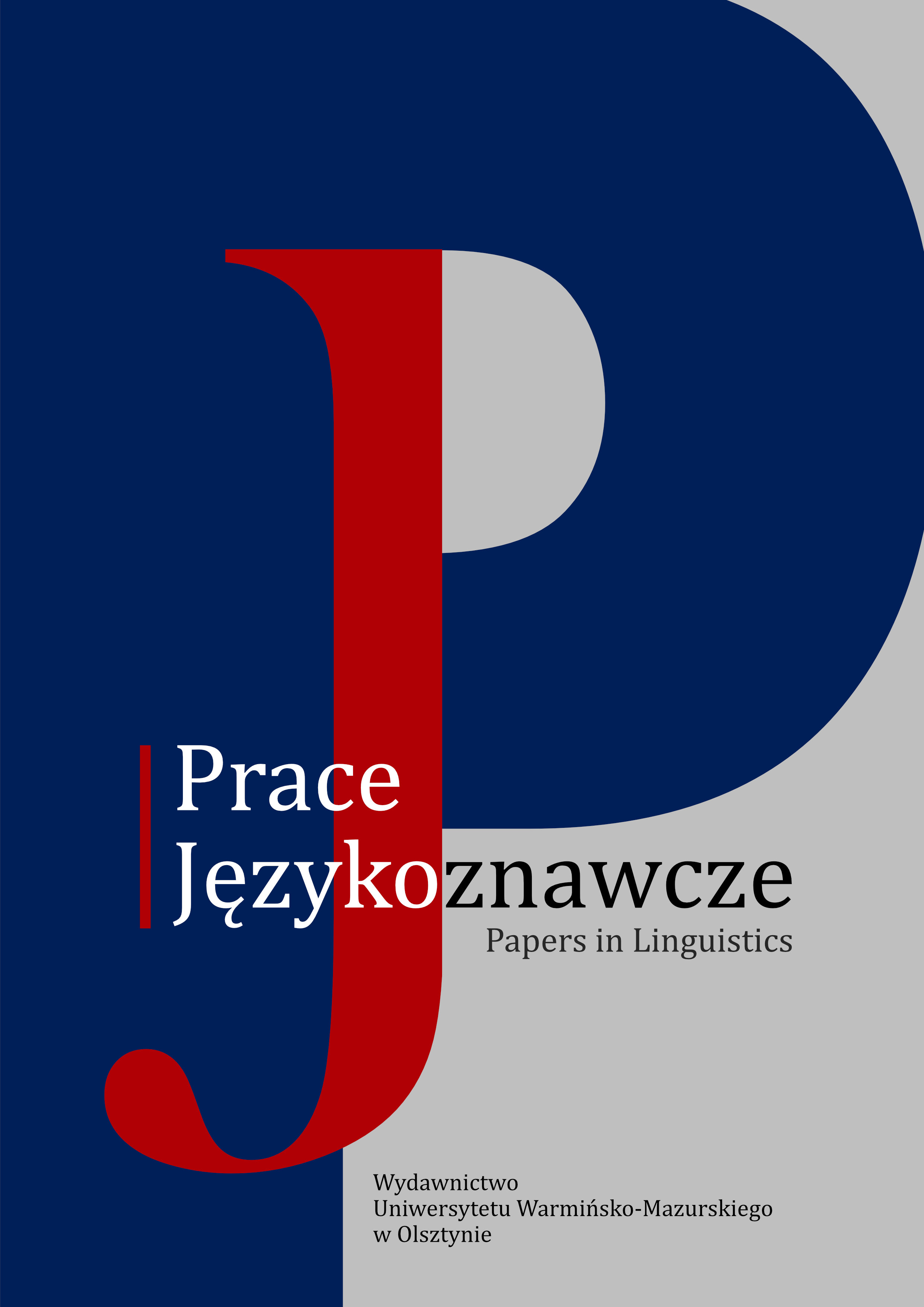
Keywords: book review; Leszek Tymiakin;
Song as a complex cultural phenomenon(Leszek Tymiakin: Song lyrics. A genological perspective.Lublin 2022, pp. 352)
More...Keywords: Bible; biblical codes; Judaism; prayer books; Jewish prayers; travel; Fanny Neuda; Rozalia Saulson;
This article aims to present the results of the analysis of travel prayers and the dangers mentionedtherein, drawn from prayer books for Jewish women published in the mid-19th century. In thecontext of Jewish religion and prayers, the most important source is the Hebrew Bible, whichcarries cultural codes. Its text serves as a framework for analysing multilingual travel prayers anddiscussing the dangers inherent in them. The awareness of threat and the accompanying negativeemotions can be described as universal phenomena, although the motives for travel, preferred des-tinations, and means of transport changed. On the other hand, the attitude of entrusting travellersto God, verbalised and preserved in the form of travel prayers, constitutes a behavioural model anda phenomenon of a universal nature.
More...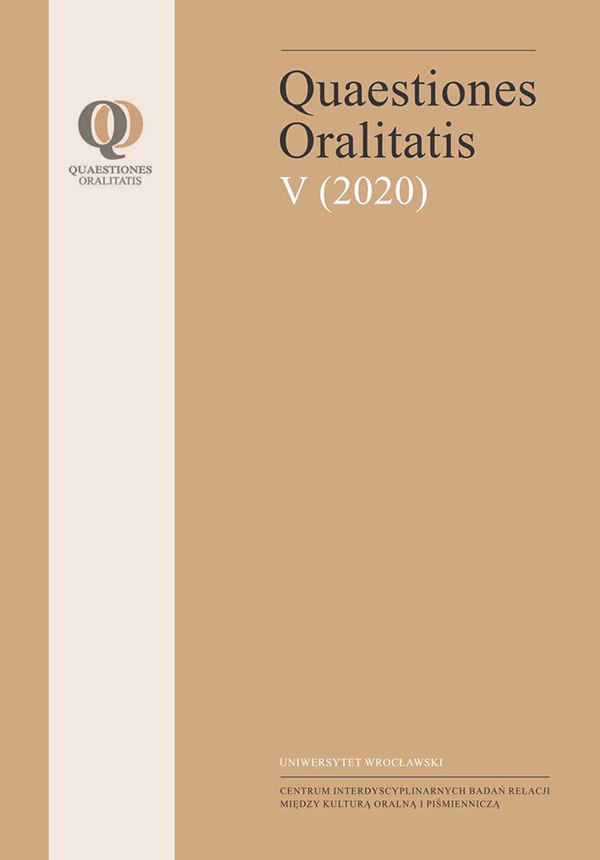
Keywords: pożyczki komercyjne; starożytny Izrael; tradycja ustna; nokrî; monarchia; zysk Opublikowane
The article discusses Deut 23,20–21 in the context of the nature of ancient Israel’s legislation and wider biblical and cultural contexts. It points that linguistic studies concerning the etymology and meaning of crucial Hebrew terms in the passage remain inconclusive. In turn, it proposes that the proper research on the issue of business and commercial loans among the Israelites should take into consideration a wider biblical (non-legislative) and cultural context of later monarchy. It also indicates that laws concerning loans expressed in the Torah were incomplete and that probably there was a fuller oral legal tradition behind the written laws. The article shows that there is an alternative way of reading the noun nokrî, as referring to economical status of an Israelite rather than to the ethnical distinctions between the Israeli and foreign peoples. Finally, it is proposed that two texts, one from OT sapiential literature (Proverbs 22:7), and the other from a narrative describing post-exilic situation (Nehemiah 5:1–5), suport the thesis that Israelites customarily expected interest on all kinds of loans given to their fellow inhabitants, although their God commanded them not to charge interest from the needy poor people. It is concluded that Deut 23,20–21 stands in line with the earlier texts of Ex 22:24 and Lev 25:35–37 and that the Israelite might have lent at interest to his compatriots as business and commercial loans.
More...